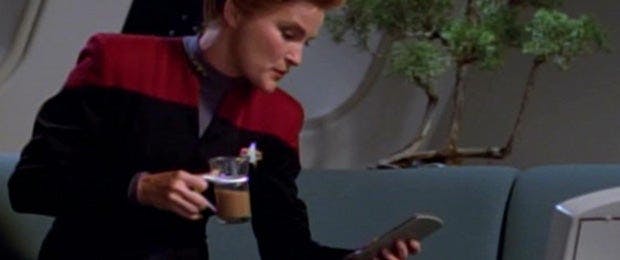Published Jan 15, 2015
20 Years Ago Today... Voyager Debuted With "Caretaker"
20 Years Ago Today... Voyager Debuted With "Caretaker"

It was 20 years ago today -- January 16, 1995 -- that Star Trek: Voyager premiered with the two-hour pilot, "Caretaker." The feature-length presentation established the central storyline, with the U.S.S. Voyager thrown to the other side of the universe (a/k/a the Delta Quadrant), 70,000 light years from home, and introduced the primary characters: Captain Janeway, Chakotay, Tuvok, B'Elanna Torres, Tom Paris, Neelix, Harry Kim and Kes; Seven of Nine would come along much later. Here are some facts and trivia you might not have know about the "Caretaker" pilot:
-- Conversations (in the form of notes) about Voyager, then untitled, started in August of 1993, as executive producers and co-creators Rick Berman, Michael Piller and Jeri Taylor bandied about ideas.

-- Robert Beltran, as Chakotay, uttered the very first line of dialogue: "Damage report!"
-- In those initial notes, the Tom Paris character was named Locarno... the character Robert Duncan McNeill had played on The Next Generation.
-- James Conway, a frequent and respected TNG director, was initially asked to direct "Caretaker," but he was not available. Thus, the late Rick Kolbe landed the job.
-- Day one of production was September 6, 1994. Genevieve Bujold shot her first scene as Janeway on September 8, but beamed off the bridge for good soon after. Kate Mulgrew, who replaced Bujold (after having nearly won the role outright during an exhaustive search process), shot her first scene on September 19.

-- Janeway drank coffee with... creamer. She never did that again.
-- Guest stars included Armin Shimerman and Mark Allen Shepherd, playing their respective Deep Space Nine characters, Quark and Morn. And then there was Richard Poe, who played the Cardassian, Gul Evek, whom he'd previously played on both DS9 and TNG.

-- Basil Langton, who played the Caretaker, passed away on May 29, 2003 at the age of 91.
-- Robert Picardo, talking to StarTrek.com a couple of years ago, remembered where he was when "Caretaker" debuted: "They flew Ethan Phillips and me to New York City and we were there the night it premiered. That’s the night I met Sumner Redstone. The pilot must have screened at a theater or in a screening room, and I remember a big party somewhere in Times Square, but what I remember most about the night was that they ran a promo or something on the Jumbotron in Times Square. That was pretty cool, seeming my face on the Jumbotron. How often does that happen? It was all to celebrate the launching of the United Paramount Network (UPN), and not just the show, but Voyager was originally the cornerstone of UPN’s programming. So, that whole night was pretty exciting and it doesn’t seem that long ago."

-- Rick Berman, discussing his feelings about Voyager with StarTrek.com in 2011, comment as follows: "It was difficult. We had just ended TNG and DS9 was in its third year, and they immediately wanted another show to take the place of TNG. We asked them to wait a couple of years. They said, 'We have all these time slots available. We don’t want to lose them.' They felt very strongly about a new series. The fact that TNG, a ship-based show, was going off the air and that we had a space station-based show on the air, meant that the obvious thing to do was create a new ship, which we did with the Voyager. We came up with a premise that, I think, was fresh or that certainly was different. We didn’t just want to have another ship, give it the name Voyager as opposed to Enterprise, and fill it with a nice balance of humans and aliens. This was a show that I asked Jeri Taylor to join Michael (Piller) and me in creating. The whole idea of being thrust to a far-off part of the galaxy and being out of touch with Starfleet, out of touch with instructions and rules, in a sense, and having to join together with Maquis that we run into in the pilot episode, the whole of idea of getting back at any cost – question mark; it shouldn’t be at any cost – I think, allowed us to do some new stuff, which was important. We were all aware that these things could get stale. A lot of the writers were the same writers and a lot of the writers were new writers, but we didn’t want to do TNG again."
